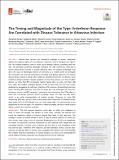The timing and magnitude of the type I interferon response are correlated with disease tolerance in arbovirus infection
Abstract
Infected hosts possess two alternative strategies to protect themselves against the negative impact of virus infections: resistance, used to abrogate virus replication, and disease tolerance, used to avoid tissue damage without controlling viral burden. The principles governing pathogen resistance are well understood, while less is known about those involved in disease tolerance. Here, we studied bluetongue virus (BTV), the cause of bluetongue disease of ruminants, as a model system to investigate the mechanisms of virus-host interactions correlating with disease tolerance. BTV induces clinical disease mainly in sheep, while cattle are considered reservoirs of infection, rarely exhibiting clinical symptoms despite sustained viremia. Using primary cells from multiple donors, we show that BTV consistently reaches higher titers in ovine cells than cells from cattle. The variable replication kinetics of BTV in sheep and cow cells were mostly abolished by abrogating the cell type I interferon (IFN) response. We identified restriction factors blocking BTV replication, but both the sheep and cow orthologues of these antiviral genes possess anti-BTV properties. Importantly, we demonstrate that BTV induces a faster host cell protein synthesis shutoff in primary sheep cells than cow cells, which results in an earlier downregulation of antiviral proteins. Moreover, by using RNA sequencing (RNA-seq), we also show a more pronounced expression of interferon-stimulated genes (ISGs) in BTV-infected cow cells than sheep cells. Our data provide a new perspective on how the type I IFN response in reservoir species can have overall positive effects on both virus and host evolution.
Citation
Hardy , A , Bakshi , S , Furnon , W , MacLean , O , Gu , Q , Varjak , M , Varela , M , Aziz , M A , Shaw , A E , Pinto , R M , Cameron Ruiz , N , Mullan , C , Taggart , A E , Da Silva Filipe , A , Randall , R E , Wilson , S J , Stewart , M E & Palmarini , M 2023 , ' The timing and magnitude of the type I interferon response are correlated with disease tolerance in arbovirus infection ' , mBio , vol. 14 , no. 3 , e0010123 . https://doi.org/10.1128/mbio.00101-23
Publication
mBio
Status
Peer reviewed
ISSN
2150-7511Type
Journal article
Description
Funding: This study was funded by an Investigator Award from the Wellcome Trust (206369/Z/17/Z). Additional funding was provided by the MRC (MC_UU_12014/10; MC_UU_12014/12).Collections
Items in the St Andrews Research Repository are protected by copyright, with all rights reserved, unless otherwise indicated.

